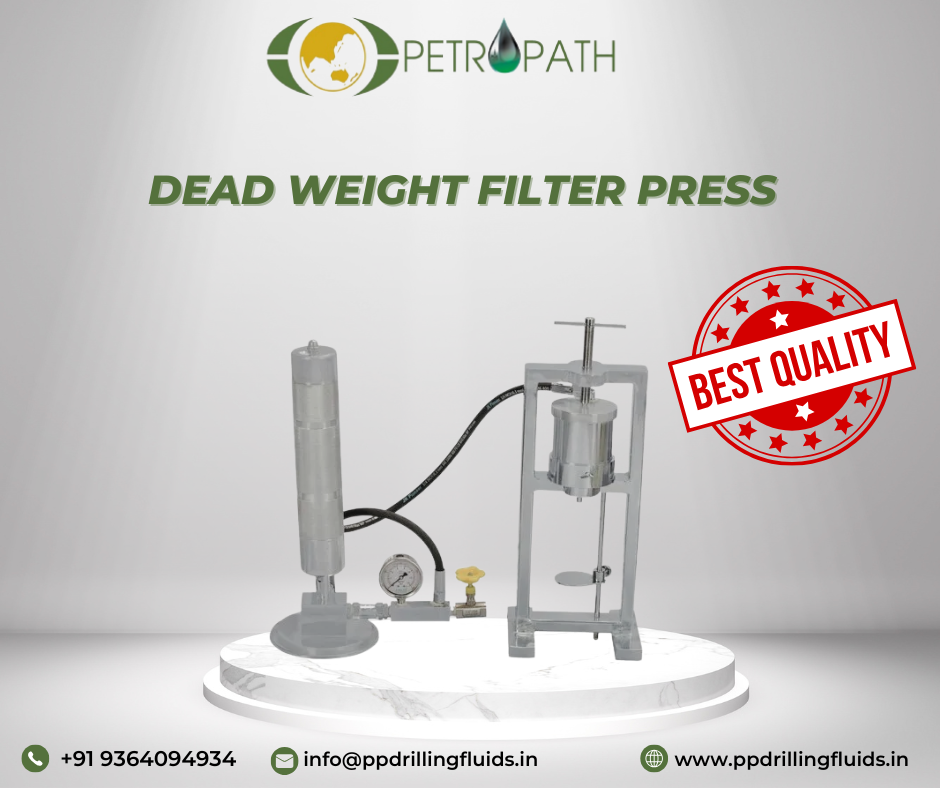In drilling operations, the ability to control and evaluate drilling fluid performance is essential for safety, efficiency, and cost-effectiveness. One of the most critical factors is the management of fluid loss, as it directly impacts wellbore integrity, formation stability, and operational success. At Petropath Fluids India Ltd., we provide advanced solutions to support the industry’s needs, including the reliable Dead Weight Filter Press—a device trusted for accurate results in controlled laboratory environments.
What is a Dead Weight Filter Press?
The Dead Weight Filter Press is a standardized laboratory instrument designed to measure the filtration properties of drilling fluids under simulated downhole conditions. By applying pressure through calibrated weights, it accurately evaluates how much liquid is lost from a mud sample and examines the quality of the filter cake formed during the process.
Unlike other systems that rely on external CO₂ cartridges or regulators, this model uses fixed weights to deliver consistent pressure, typically at 100 psi or 500 psi. This eliminates variability, making it highly dependable for repeatable fluid loss testing.

Key Components
- Mud Cell – Holds the drilling fluid sample.
- Filter Paper/Medium – Represents the permeability of the formation.
- Dead Weights – Apply precise hydraulic pressure.
- Filtrate Collection Tube – Collects liquid expelled during the test.
- Support Stand & Clamp – Provides stability and safety during operation.
Each component works together to provide consistent results, making it an essential part of mud testing equipment in laboratories and field testing facilities.
How It Works
- A sample of drilling mud is placed in the mud cell.
- A filter paper is positioned at the bottom to act as the formation barrier.
- The unit is assembled, sealed, and mounted securely.
- Dead weights are added to apply the desired pressure.
- The test runs for 30 minutes, during which filtrate is collected.
- The volume of filtrate and the condition of the filter cake are analyzed.
This simple yet effective process provides valuable insight into the performance of drilling fluids and supports more accurate drilling fluid analysis.
Why Fluid Loss Testing Matters
- Minimize fluid invasion into formations.
- Prevent differential sticking of the drill string.
- Enhance wellbore stability and formation integrity.
- Reduce Non-Productive Time (NPT) and operational risks.
When drilling fluids are well-optimized, they maintain hydrostatic balance and ensure reliable performance in diverse geological environments.
Role in Drilling Fluid Analysis
At Petropath Fluids India Ltd., This is central to our services. Our laboratories use it to evaluate mud systems, test filtration control additives, and ensure fluids are fit for complex drilling environments.
Through this testing, our engineers can:
Select the right fluid loss control agents such as PAC, CMC, or starch.
Fine-tune mud formulations for specific formations.
Detect early signs of abnormal mud behavior.
Provide actionable recommendations for operators in real time.
Advantages of Using Petropath’s this product
- Accurate Results: Calibrated weights ensure consistent pressure.
- Durable Construction: Built for long-term use in labs and the field.
- Easy to Use: No external gas or regulators required.
- Portable Design: Suitable for both on-site and laboratory testing.
FAQs
What is a Dead Weight Filter Press?
A lab device for fluid loss testing in drilling fluids using calibrated dead weights.
Why is fluid loss testing important?
It prevents formation damage, improves wellbore stability, and reduces downtime.
How does it work?
Mud is pressurized with dead weights, filtrate is collected in 30 minutes, and filter cake is analyzed.
What makes it different?
It uses weights instead of CO₂ or regulators, ensuring consistent and accurate results.
Where is it used?
In drilling labs, oil & gas operations, research, and training centers.
At Petropath Fluids India Ltd., we are dedicated to providing solutions that improve performance and safety in drilling operations. With decades of expertise and a focus on innovation, we ensure that every piece of equipment—including this product —meets the highest quality standards. Our skilled technicians and engineers are always available to support clients in achieving reliable results.
Applications Across the Industry
- Oil & gas drilling operations.
- Research laboratories.
- Educational institutions for training.
- Service companies monitoring fluid systems.
Conclusion
This is more than just an instrument; it is a vital component of effective fluid loss testing and drilling fluid analysis. By ensuring accurate measurement of filtration properties, it helps operators reduce risks, improve efficiency, and maintain wellbore stability in even the most challenging conditions.
Ready to take the next step? Connect with our team today and explore how we can support your operations with reliable solutions tailored to your needs.
We provide worldwide delivery, custom configurations, and technical support tailored to your operational needs.

